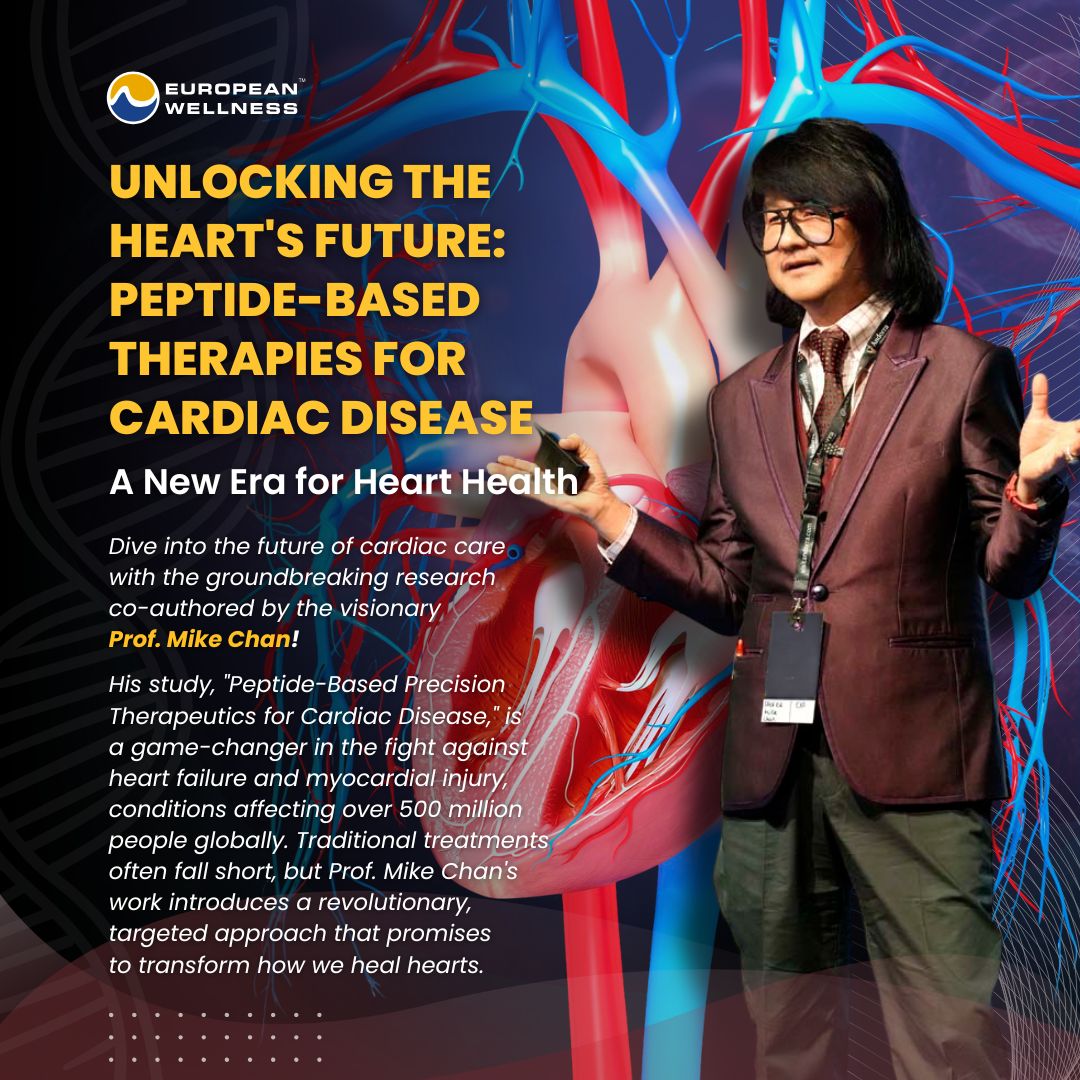From loyal dogs to playful cats and majestic horses, our animals are family. On this…

Unlocking the Heart’s Future: Peptide-Based Therapies for Cardiac Disease
HEIDELBERG, Germany, July 18, 2025 – Cardiac diseases, particularly chronic heart failure and acute myocardial injury, pose a significant global health challenge, affecting over 500 million individuals worldwide. Despite advancements in traditional treatments, limitations in efficacy and targeted delivery persist. However, a groundbreaking study co-authored by the esteemed Prof. Mike Chan, titled “Peptide-Based Precision Therapeutics for Cardiac Disease: Targeting Mitochondrial Dysfunction, Fibrosis, and Inflammation,” sheds light on a revolutionary approach to combating these debilitating conditions. This research, published in the American Journal of Biomedical Science & Research, delves into the immense potential of peptide-based therapies to redefine the future of cardiovascular care.
The Unmet Need in Cardiac Care
For too long, conventional treatments for heart conditions have faced hurdles. Imagine trying to fix a complex machine with a wrench that’s too big or too small – that’s often the challenge with current cardiac therapies. They might work broadly, but they often lack the precision needed to tackle the specific, microscopic issues within heart cells. This can lead to side effects, or simply not being effective enough for many patients, especially those with advanced disease. As Prof. Mike Chan emphasizes,
“The myocardium presents a particularly challenging therapeutic landscape, characterized by complex cellular heterogeneity, electromechanical coupling, and high metabolic demand.”
This complexity means that a one-size-fits-all approach simply isn’t enough.
Peptides: Precision Tools for the Heart
This is where peptide-based therapeutics come into play, offering a beacon of hope. Think of peptides as highly specialized, tiny keys designed to unlock very specific doors within our cells. Unlike broad-acting drugs, these peptides can target the root causes of heart disease at a cellular level, minimizing unwanted side effects. Prof. Mike Chan and his team highlight two particularly promising types: Nano-Organo Peptides (NOPs) and Mitochondria-Targeted Peptides (MTPs).
NOPs are like microscopic delivery drones. They combine beneficial peptides with tiny nanocarriers, allowing them to precisely deliver their therapeutic cargo to injured heart tissue. This means the treatment goes exactly where it’s needed, like a targeted missile, improving stability and retention in areas affected by scarring, inflammation, or lack of blood flow. Imagine a tiny repair crew being sent directly to the damaged parts of your heart, rather than just spraying medicine everywhere.
MTPs, on the other hand, are focused on the powerhouses of our cells: the mitochondria. These tiny organelles are crucial for energy production, and when they malfunction, the heart suffers. MTPs, such as the well-studied SS-31 (elamipretide), work by stabilizing these mitochondrial powerhouses, reducing harmful byproducts (reactive oxygen species), and boosting energy production. Prof. Mike Chan states,
“Mitochondrial dysfunction is a key intracellular driver of cardiac injury.”
By directly addressing this, MTPs help the heart cells regain their strength and function. It’s like giving your heart’s batteries a supercharge, making them more efficient and resilient.
Solutions and a Brighter Future
The research paper outlines several key solutions offered by these peptide-based therapies:
- Targeting Mitochondrial Dysfunction: As mentioned, MTPs like SS-31 directly address the energy crisis in heart cells by stabilizing mitochondria, leading to improved cardiac output and reduced damage in preclinical models. This is crucial because, as Prof. Mike Chan notes, “By integrating cardiac pathophysiology with advanced peptide design and targeted delivery, these agents represent a new frontier in precision cardiac injury reversal.” This means we can potentially reverse damage that was once thought irreversible.
- Reducing Fibrosis: Cardiac fibrosis, or scarring of the heart tissue, stiffens the heart and impairs its function. The study highlights anti-fibrotic peptides that can inhibit the signaling pathways responsible for this scarring, leading to improved heart compliance. This is like preventing concrete from hardening in your heart, keeping it flexible and efficient.
- Attenuating Inflammation: Chronic inflammation contributes significantly to heart failure. Peptide inhibitors can target and reduce these inflammatory responses, preserving cardiac function. Imagine a fire extinguisher putting out harmful inflammation in your heart, preventing further damage.
- Enhanced Delivery and Specificity: Both NOPs and MO peptides are designed to overcome the limitations of traditional drug delivery. They can be engineered to specifically target injured heart cells and even specific organelles within those cells, ensuring the therapeutic agents reach their intended destination with minimal off-target effects. This is a significant leap forward, moving from a shotgun approach to a laser-focused one.
Prof. Mike Chan’s work, along with his collaborators, paints a hopeful picture for the future of cardiac care. These precision therapeutics offer the potential to not only manage but actively reverse the damage caused by heart disease, leading to better quality of life and longer lifespans for millions. The journey from preclinical studies to widespread clinical use is ongoing, but the foundation laid by this research is undeniably strong.
To delve deeper into this pivotal research, you can access the full paper at: https://european-wellness.eu/publications/peptide-based-precision-therapeutics/
Follow European Wellness Academy:


